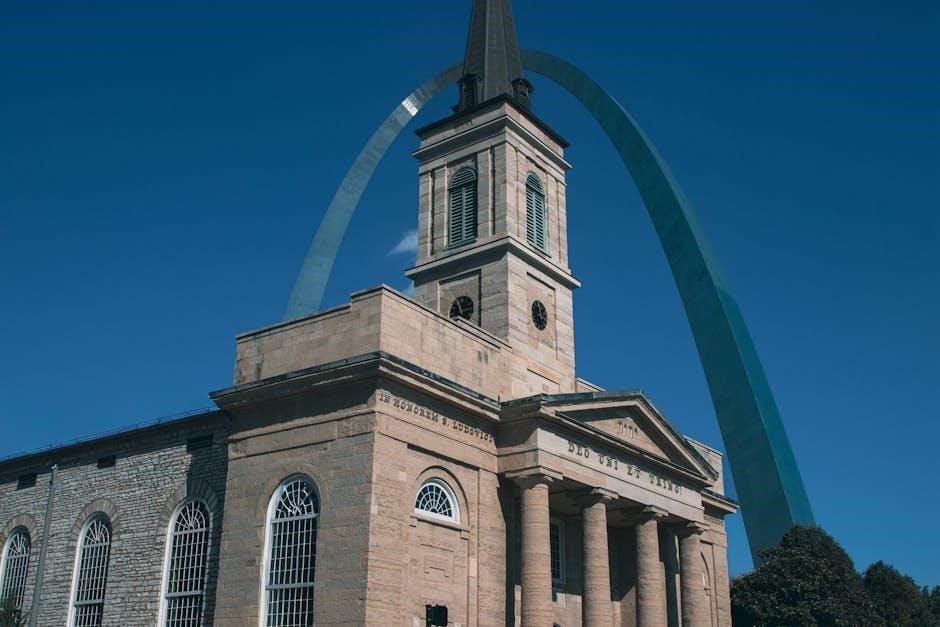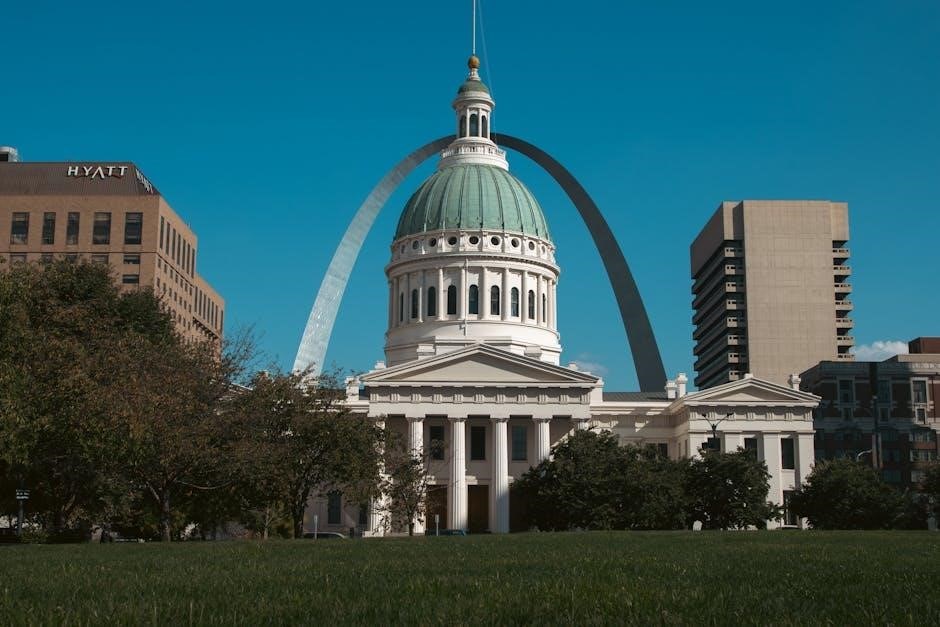The Missouri Charge Code Manual 2024 is a comprehensive guide published by the Missouri State Highway Patrol, detailing standardized codes for criminal offenses․ It ensures uniform reporting across agencies, covering crimes from August 28, 2024, to August 27, 2025, and is accessible online for criminal justice officials․
1․1 Purpose and Overview
The Missouri Charge Code Manual 2024 serves as a standardized guide for criminal justice agencies to report offenses consistently․ Published by the Missouri State Highway Patrol with Supreme Court approval, it ensures uniformity in tracking arrest and conviction data․ The manual enhances law enforcement safety, provides clear offense definitions, and aligns with state laws․ Its purpose is to simplify reporting processes, reduce errors, and maintain accurate criminal justice statistics․ The 2024 edition covers offenses from August 28, 2024, to August 27, 2025, and is accessible online for all agencies․
1․2 Importance in Criminal Justice Procedures
The Missouri Charge Code Manual 2024 is vital for ensuring accuracy and consistency in criminal justice reporting․ By standardizing offense codes, it facilitates efficient data collection and analysis, aiding in legal compliance and case management․ The manual supports law enforcement in maintaining precise records, which are critical for court proceedings, statistical tracking, and resource allocation․ Its standardized codes also enhance interoperability between agencies, ensuring seamless communication and coordination in criminal justice operations statewide․

Structure and Organization of the Manual
The Missouri Charge Code Manual 2024 is organized into sections covering charge codes, NCIC/state modifiers, and criminal offense classifications, ensuring a structured approach for criminal justice reporting․
2․1 Classification of Offenses
The Missouri Charge Code Manual 2024 classifies offenses based on their legal definitions and severity, ensuring consistency in criminal justice reporting․ Crimes are categorized into felonies, misdemeanors, and infractions, with subcategories for violent, property, and drug-related offenses․ This system aids law enforcement and courts in uniform data collection and legal processing․ Each classification aligns with state laws and reporting standards, facilitating accurate charge code assignment and statistical analysis․ This structure ensures clarity and precision in criminal justice procedures across Missouri․
2․2 Charge Code Assignment Process
The assignment of charge codes in the Missouri Charge Code Manual 2024 involves a systematic process to ensure accuracy and uniformity․ Law enforcement agencies begin by identifying the specific offense based on the incident report․ The offense is then cross-referenced with the manual to determine the appropriate charge code․ This process includes verifying the severity of the crime, such as felony or misdemeanor classification, and applying relevant NCIC and state-specific modifiers․ Training and updates are provided to ensure proper adherence to the coding standards, maintaining consistency across all agencies․
2․3 Role of NCIC and State Modifiers
The NCIC (National Crime Information Center) codes provide a standardized system for classifying criminal offenses nationally․ Missouri incorporates these codes into its manual, ensuring compatibility with federal reporting systems․ State-specific modifiers further customize charges to reflect unique circumstances or enhancements under Missouri law․ Together, NCIC codes and state modifiers ensure detailed and accurate tracking of offenses, aiding in law enforcement reporting, statistical analysis, and case management․ This dual system enhances the precision and utility of the charge code manual for criminal justice operations․

Publication and Updates
The Missouri Charge Code Manual 2024 is published annually by the Missouri State Highway Patrol․ Updates ensure alignment with evolving laws and reporting standards․
3․1 Effective Period of the 2024 Manual
The Missouri Charge Code Manual 2024 is effective from January 1, 2024, to December 31, 2024․ During this period, it serves as the official reference for all criminal justice agencies in Missouri․ Any updates or revisions will be provided through quarterly supplements․ Compliance with the manual is mandatory during its effective period․ Agencies must adhere to the guidelines to ensure accurate charge code assignments and reporting․ Failure to comply may result in reporting errors or legal discrepancies․
3․2 Quarterly Supplements and Revisions
The Missouri Charge Code Manual 2024 is updated quarterly to reflect legal changes, new offenses, or clarification of existing codes․ Supplements are released in January, April, July, and October․ These revisions ensure the manual remains aligned with current laws and criminal justice practices․ Agencies are required to incorporate these updates promptly to maintain compliance․ Notifications of revisions are distributed via the Missouri State Highway Patrol website and email alerts․ Staying updated is critical for accurate charge code assignments and reporting․ Regular reviews help prevent errors and ensure adherence to state guidelines․
3․4 Accessibility on the Missouri State Highway Patrol Website

Usage and Compliance
The Missouri Charge Code Manual 2024 ensures standardized reporting and data integrity across criminal justice agencies, promoting uniformity in charge code applications and compliance with state laws․
4․1 Reporting Requirements for Criminal Justice Agencies
The Missouri Charge Code Manual 2024 mandates that all criminal justice agencies adhere to strict reporting standards․ Agencies must accurately classify offenses using the standardized charge codes and submit reports within designated timeframes․ Compliance ensures consistency in data collection and legal proceedings․ Proper documentation and submission of reports are critical for maintaining accurate records and facilitating efficient communication between agencies․ Adherence to these requirements supports uniform enforcement of laws and effective administration of justice statewide․
4․2 Compliance Standards for Law Enforcement
Law enforcement agencies in Missouri must adhere to established compliance standards when utilizing the 2024 Charge Code Manual․ Officers are required to complete annual training to ensure accurate charge code application․ Proper use of charge codes is critical for maintaining data integrity and upholding legal standards․ Non-compliance may result in reporting errors, jeopardizing case outcomes․ Regular audits and reviews are conducted to ensure adherence to these standards, promoting accountability and fairness within the criminal justice system․ Compliance is essential for maintaining public trust and operational efficiency․

Legal and Procedural Guidelines
The Missouri Charge Code Manual 2024 ensures adherence to state laws and proper charge code application, maintaining legal accuracy and procedural consistency across all criminal justice processes․
5․1 Alignment with Missouri State Laws
The Missouri Charge Code Manual 2024 is meticulously aligned with Missouri state laws, ensuring charge codes reflect current statutes, court decisions, and legal definitions․ It incorporates updates from the Missouri Revised Statutes (MRS) and maintains consistency with legislative changes․ The manual undergoes annual reviews by legal experts to ensure compliance with state and federal mandates․ This alignment guarantees that law enforcement, prosecutors, and the judiciary can apply charge codes accurately, maintaining legal integrity and procedural fairness across all criminal justice processes in Missouri․
5․2 Specific Crime Codes and Definitions
The Missouri Charge Code Manual 2024 provides detailed definitions and specific codes for various criminal offenses, ensuring clarity and consistency in charging practices․ Each crime code is paired with a clear description, legal references, and examples to guide accurate classification․ The manual covers offenses such as assault, theft, and drug-related crimes, with precise definitions to prevent ambiguity․ This ensures that law enforcement and prosecutors can apply the correct codes, maintaining uniformity and fairness in the criminal justice system across Missouri․

Examples of Charge Code Applications
This section provides examples illustrating how charge codes are applied in real scenarios, ensuring clarity and consistency for law enforcement and criminal justice professionals․
6․1 Assault 1st Degree and Special Victim Cases
The 2024 Missouri Charge Code Manual provides specific codes for Assault 1st Degree, designating severe cases with unique identifiers․ For instance, charge code 060110 applies to Assault 1st Degree involving serious physical injury․ Special victim cases, such as assaults against law enforcement officers or minors, require additional modifiers to ensure accurate reporting․ These codes help differentiate cases involving special victims, ensuring proper legal handling and data tracking․ This section offers detailed examples to guide officers in assigning correct codes for such sensitive and complex offenses․
6․2 Motor Vehicle Offenses and Related Codes
The 2024 Missouri Charge Code Manual includes detailed codes for motor vehicle offenses, ensuring precise reporting․ For example, Driving Under the Influence (DUI) is coded as 130160, while Reckless Driving is assigned 130140․ Related codes, such as 130130 for Careless and Imprudent Driving, provide further specificity․ These codes help law enforcement track violations accurately and maintain uniformity in enforcement․ The manual also covers commercial vehicle offenses, enhancing public safety through standardized reporting practices․

Challenges and Considerations
The Missouri Charge Code Manual 2024 presents challenges, including complex code selections and frequent updates․ Errors can lead to reporting inaccuracies, affecting crime data and legal proceedings․
7․1 Complexity of Charge Code Selection
The Missouri Charge Code Manual 2024 requires precise selection of charge codes, which can be challenging due to the vast number of offenses and nuanced distinctions․ Law enforcement must carefully analyze each case to ensure accurate code assignment, as incorrect selections can lead to mismapped crimes in state and federal databases․ The complexity increases with special modifiers andNCIC codes, requiring thorough training and understanding of legal definitions․ This ensures uniform reporting and proper data integrity across criminal justice systems․
7․2 Potential for Errors in Reporting
The Missouri Charge Code Manual 2024 highlights the potential for reporting errors due to human oversight or misinterpretation of offense classifications․ Incorrect charge code entries can lead to mismapping of crimes, affecting crime statistics and law enforcement strategies․ Errors may stem from misunderstanding legal definitions or failing to apply NCIC modifiers correctly․ Such inaccuracies can compromise data integrity, leading to flawed trend analysis and potential legal repercussions․ Regular training and adherence to compliance standards are critical to minimizing these risks and ensuring reliable reporting across criminal justice agencies․

Best Practices for Implementation
Adopting standardized training programs and staying updated on charge code revisions ensures compliance and accuracy in criminal justice reporting, enhancing overall efficiency and data reliability․
8․1 Training for Criminal Justice Officials
Comprehensive training programs are essential for criminal justice officials to master the Missouri Charge Code Manual 2024․ Regular workshops and online courses ensure familiarity with charge codes, state laws, and reporting protocols․ Agencies should prioritize hands-on exercises to improve accuracy in code selection and data entry․ Continuous updates and refresher sessions help officials stay informed about revisions and new codes․ This structured approach fosters consistency, reduces errors, and enhances the integrity of criminal justice processes across Missouri․
8․2 Regular Updates and Notifications
Regular updates and notifications are critical to ensure the accuracy and relevance of the Missouri Charge Code Manual 2024․ The Missouri State Highway Patrol issues quarterly supplements to reflect legislative changes, new charge codes, and procedural adjustments․ Notifications are distributed via email, the MSHMP website, and law enforcement bulletins․ Agencies are encouraged to monitor these updates to maintain compliance and apply the most current codes effectively․ Timely notifications help reduce reporting errors and ensure alignment with evolving state laws and criminal justice practices․

Future of the Missouri Charge Code Manual
The 2024 manual sets the stage for future enhancements, including expanded charge codes, improved data integration, and advanced reporting systems to meet evolving law enforcement needs․
9․1 Anticipated Changes for 2025-2026 Edition
The 2025-2026 edition of the Missouri Charge Code Manual is expected to include new crime codes for emerging offenses, updated modifiers, and enhanced data collection standards․ Provisions for electronic reporting will likely expand, improving efficiency for law enforcement․ Additional guidance on complex cases, such as cybercrimes and hate crimes, will be incorporated to reflect legislative changes․ The manual may also introduce streamlined charge code selection processes to reduce errors and improve consistency across agencies․ These updates aim to align the manual with advancements in technology and evolving legal requirements․
9․2 Technological Enhancements in Reporting
The 2024 Missouri Charge Code Manual integrates advanced reporting technologies to enhance accuracy and efficiency․ A new online platform allows law enforcement to submit charge codes electronically, reducing paperwork․ Real-time data validation ensures correct code selection, minimizing errors․ Mobile accessibility enables officers to update reports from the field․ Enhanced data analytics tools provide insights into crime trends, aiding strategic planning․ Additionally, the system includes automated alerts for code updates, ensuring compliance with the latest changes․ These technological improvements streamline reporting processes and improve overall system performance․

Supplementary Resources
The Missouri Charge Code Manual 2024 offers supplementary resources, including training materials and detailed guides․ These tools aid in understanding and applying charge codes effectively․
10․1 Motor Vehicle Offense Handbook
The Motor Vehicle Offense Handbook complements the Missouri Charge Code Manual 2024, providing detailed guidance on traffic-related offenses․ It includes state-specific traffic laws, charge code mappings, and reporting instructions․ Designed for law enforcement and court personnel, it simplifies the classification of motor vehicle offenses, ensuring accurate reporting․ The handbook also offers examples of common offenses, such as speeding, DWI, and reckless driving, along with their corresponding charge codes; Regular updates align it with the latest legal changes, making it an indispensable resource for consistent and precise charge code application․
10․2 Local Agency Edition Supplements
The Local Agency Edition Supplements are tailored resources for individual law enforcement agencies, providing localized charge code applications and procedures․ These supplements address specific municipal or regional ordinances, ensuring compliance with both state and local laws․ They include examples relevant to local jurisdictions and are updated periodically to reflect changes in legislation․ Distributed alongside the main manual, they enhance the efficiency of charge code implementation at the local level, fostering consistency and accuracy in reporting practices across Missouri․

